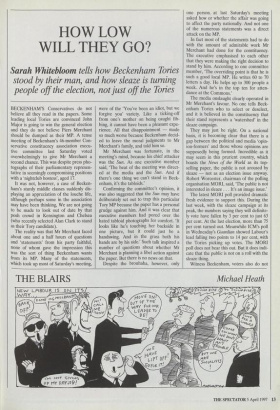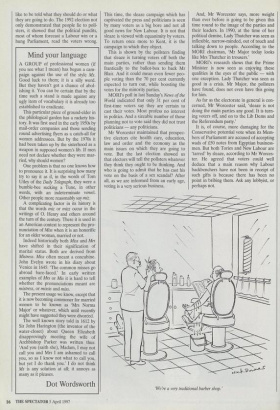HOW LOW WILL THEY GO?
Sarah Whitebloom tells how Beckenham Tories
stood by their man, and how sleaze is turning people off the election, not just off the Tories
BECKENHAM'S Conservatives do not believe all they read in the papers. Some leading local Tories are convinced John Major is going to win the general election and they do not believe Piers Merchant should be dumped as their MP. A tense meeting of Beckenham's 46-member Con- servative constituency association execu- tive committee last Saturday voted overwhelmingly to give Mr Merchant a second chance. This was despite press pho- tographs of their parliamentary represen- tative in seemingly compromising positions with a 'nightclub hostess', aged 17.
It was not, however, a case of Becken- ham's sturdy middle classes suddenly dis- playing an appreciation of the louche life, although perhaps some in the association may have been thinking, We are not going to be made to look out of date by that posh crowd in Kensington and Chelsea (who recently selected Alan Clark to stand as their Tory candidate).
The reality was that Mr Merchant faced about one and a half hours of questions and 'statements' from his party faithful, none of whom gave the impression this was the sort of thing Beckenham wants from its MP. Many of the statements, which took up most of Saturday's meeting, were of the 'You've been an idiot, but we forgive you' variety. Like a ticking-off from one's mother on being caught fib- bing, it cannot have been a pleasant expe- rience. All that disappointment — made so much worse because Beckenham decid- ed to leave the moral judgments to Mr Merchant's family, and told him so.
Mr Merchant was fortunate, in the meeting's mind, because his chief attacker was the Sun. As one executive member said, 'The heat of the meeting was direct- ed at the media and the Sun. And if there's one thing we can't stand in Beck- enham, it's the tabloids.'
Confirming the committee's opinion, it was also suggested that the Sun may have deliberately set out to trap this particular Tory MP because the paper has a personal grudge against him. And it was clear that executive members had pored over the hated tabloid photographs for comfort. 'It looks like he's touching her backside in one picture, but it could just be a handswing. And in the grass both his hands are by his side.' Such talk inspired a number of questions about whether Mr Merchant is planning a libel action against the paper. But there is no news on that.
Despite the brouhaha, however, only one person. at last Saturday's meeting asked how or whether the affair was going to affect the party nationally. And not one of the numerous statements was a direct attack on the MP.
In fact most of the statements had to do with the amount of admirable work Mr Merchant had done for the constituency.
The executive emphasised to each other that they were making the right decision to stand by him. According to one committee member, 'The overriding point is that he is such a good local MP. He writes 60 to 70 letters a day. He helps up to 300 people a week. And he's in the top ten for atten- dance at the Commons.'
The media onslaught clearly operated in Mr Merchant's favour. No one tells Beck- enham Tories who to select or deselect, and it is believed in the constituency that their stand represents a 'watershed' in the sleaze campaign.
They may just be right. On a national basis, it is becoming clear that there is a gap between the political and media 'opin- ion-formers' and those whose opinions are supposedly being formed. Incredible as it may seem in this prurient country, which boasts the News of the World as its top- selling paper, the public is not aroused by sleaze — not as an election issue anyway. Robert Worcester, chairman of the polling organisation MORI, said, 'The public is not interested in sleaze . . . It's an image issue.'
The latest MORI poll provided dramatic fresh evidence to support this. During the last week, with the sleaze campaign at its peak, the numbers saying they will definite- ly vote have fallen by 3 per cent to just 63 per cent. At the last election, more than 75 per cent turned out. Meanwhile ICM's poll in Wednesday's Guardian showed Labour's lead falling two points to 14 per cent, with the Tories picking up votes. The MORI poll does not bear this out. But it does indi- cate that the public is not on a roll with the sleaze thing.
Witness Beckenham, voters also do not like to be told what they should do or what they are going to do. The 1992 election not only demonstrated that people lie to poll- sters, it showed that the political pundits, most of whom forecast a Labour win or a hung Parliament, read the voters wrong. This time, the sleaze campaign which has captivated the press and politicians is seen by many voters as a big bore and not all good news for New Labour. It is not that sleaze is viewed with equanimity by voters. To return once more to Kent, it is the campaign to which they object.
This is shown by the pollsters finding that sleaze is turning voters off both the main parties, rather than sending them frantically to the ballot-box to back Mr Blair. And it could mean even fewer peo- ple voting than the 70 per cent currently expected to turn out, while boosting the votes for the minority parties.
MORI's poll in last Sunday's News of the World indicated that only 31 per cent of first-time voters say they are certain to cast their votes. Most profess no interest in politics. And a sizeable number of those planning not to vote said they did not trust politicians — any politicians.
Mr Worcester maintained that prospec- tive electors cite health care, education, law and order and the economy as the main issues on which they are going to vote. But the last election showed us that electors will tell the pollsters whatever they think they ought to be thinking. And who is going to admit that he has cast his vote on the basis of a sex scandal? After all, as we are informed from an early age, voting is a very serious business. And, Mr Worcester says, more weight than ever before is going to be given this time round to the image of the parties and their leaders. In 1990, at the time of her political demise, Lady Thatcher was seen as inflexible, narrow-minded, out of touch and talking down to people. According to the MORI chairman, 'Mr Major today looks like Mrs Thatcher in trousers.'
MORI's research shows that the Prime Minister is now seen as enjoying these qualities in the eyes of the public — with one exception. Lady Thatcher was seen as good in a crisis. Mr Major, the pollsters have found, does not even have this going for him.
As far as the electorate in general is con- cerned, Mr Worcester said, 'sleaze is not doing the main parties any good. It is turn- ing voters off, and on to the Lib Dems and the Referendum party.'
It is, of course, more damaging for the Conservative potential vote when its Mem- bers of Parliament are accused of accepting wads of £50 notes from Egyptian business- men. But both Tories and New Labour are `tarred' by sleaze, according to Mr Worces- ter. He agreed that voters could well deduce that a main reason why Labour backbenchers have not been in receipt of such gifts is because there has been no point in bribing them. Ask any lobbyist, or perhaps not.
`We're a very traditional barber shop.'



























































 Previous page
Previous page